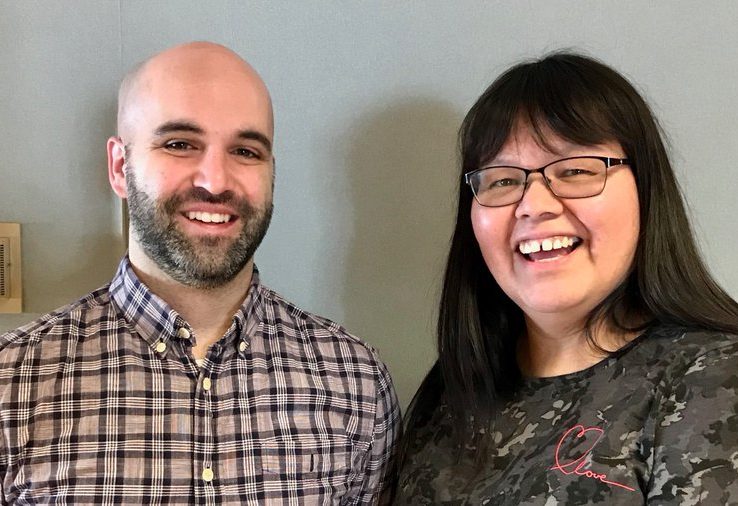NOSM celebrates 15 years working with Local Community Coordinators
Posted on May 7, 2020
First-year medical students at the Northern Ontario School of Medicine (NOSM) spend four weeks in an Indigenous community as part of their Integrated Community Experience (ICE). Since 2006, NOSM has relied on Local Community Coordinators (LCC) to guide and support medical students while they are there. The LCC role is key to the success of the community placement experience. This year will be the exception. Due to COVID-19 alternative learning plans are being considered to deliver this important and unique experience to NOSM students.
“For many students, it is a transformative experience,” says Dr. Lorrilee McGregor, NOSM Assistant Professor of Indigenous Health. “I think many students have some preconceived notions of what it’s like, but by being in the community they observe what we mean by social determinants of health. They see housing conditions, water quality and they actually learn that this is not an abstract, theoretical thing. These social determinants of health are actually impacting people’s lives.”
Leroy Quoquat is from Lac Seul First Nation, a community of approximately 2,500 people located 480 kilometres from Thunder Bay. He has been an LCC for 13 years and says the community helps sensitize students. Quoquat says first-year NOSM students are introduced to the Lac Seul nursing practice, as well as treatment and public health programs in collaboration with the community health centre. However, he points out the value of the non-clinical experiences that have a big impact on students.
“We have specific people from our community who give the students a wide range of knowledge, including traditional and cultural knowledge, and they are immersed in the cultural aspects of community and traditional activities,” Quoquat says.
“I think it’s quite the experience for them, it opens their eyes to our day-to-day lives. It’s also important for the student to gain an understanding of what we provide in terms of health care at the community level,” says Quoquat. He says cultural experiences like fishing and being out on the land are ways of life that are directly linked to the health of his community.
Melissa Roy has been Wiikwemkoong First Nation’s LCC for 10 years. In her community, the cultural experience began as a pilot project and later community members decided it should continue. She recalls personally witnessing significant changes.
“One student had a total change of perspective after being on reserve. It made me emotional to see how he completely turned his view around,” says Roy.
“I think when the students come to our community, I’m here and I’m pretty flexible. I let them explore on their own, and they all enjoy the youth centre and they see all of the teachings that happen there. The students also learn about traditional medicine we have here,” Roy explains. “It’s really nice when students learn how resourceful Wiikwemkoong is and when community members ask when the students are coming. They look forward to having them here.”
For Lorna Pawis, an LCC in Wasauksing First Nation near Parry Sound, the medical students have had a positive impact on young people in her community.
“The medical students provide motivation for the youth. They help motivate them to go forward in their career paths in whatever they choose,” says Pawis. “They look forward to them coming and we enjoy sharing our way of life.”
Pawis says other valuable lessons include community teachings about drug and alcohol programs, as well as traditional teachings that include the Ojibwe language, moccasin making with Elders, fishing, and meeting with people in the community.
“Cultural immersion is important,” says Dr. McGregor, “because it gives our medical students a more balanced perspective of community life.”
“Often, what’s reported in the media is many of the negative aspects, but the medical students are also exposed to all of the really powerful and positive impacts of the community. They participate in things like our language and culture, our ceremonies and experiences. It’s a full immersion experience,” says Dr. McGregor.
“Many students haven’t been to an Indigenous community before and there can be anxiety about it. We try to address a lot of that in our prep sessions leading up to the actual experience. We do the blanket exercise, offer sharing circles, and discuss protocols to prepare them ahead of time,” says Dr. McGregor. “This is how we develop relationships. I think the long-term expectation of the communities is that our graduates will decide to work near or closer to, and with, our communities.”
Dr. Alex Anawati, an Emergency Room physician in Sudbury and NOSM alumnus, says his experience in Fort Albany 15 years ago challenged his biases and taught him many lessons that have helped him champion NOSM’s social accountability mandate.
“Those lessons come with me to the emergency department and when I’m teaching medical students. This valuable cultural experience has helped me articulate why we need social accountability in medical education,” says Dr. Anawati. “Jackie and Fort Albany, thank you for that. These are teachings I will carry with me always.”


